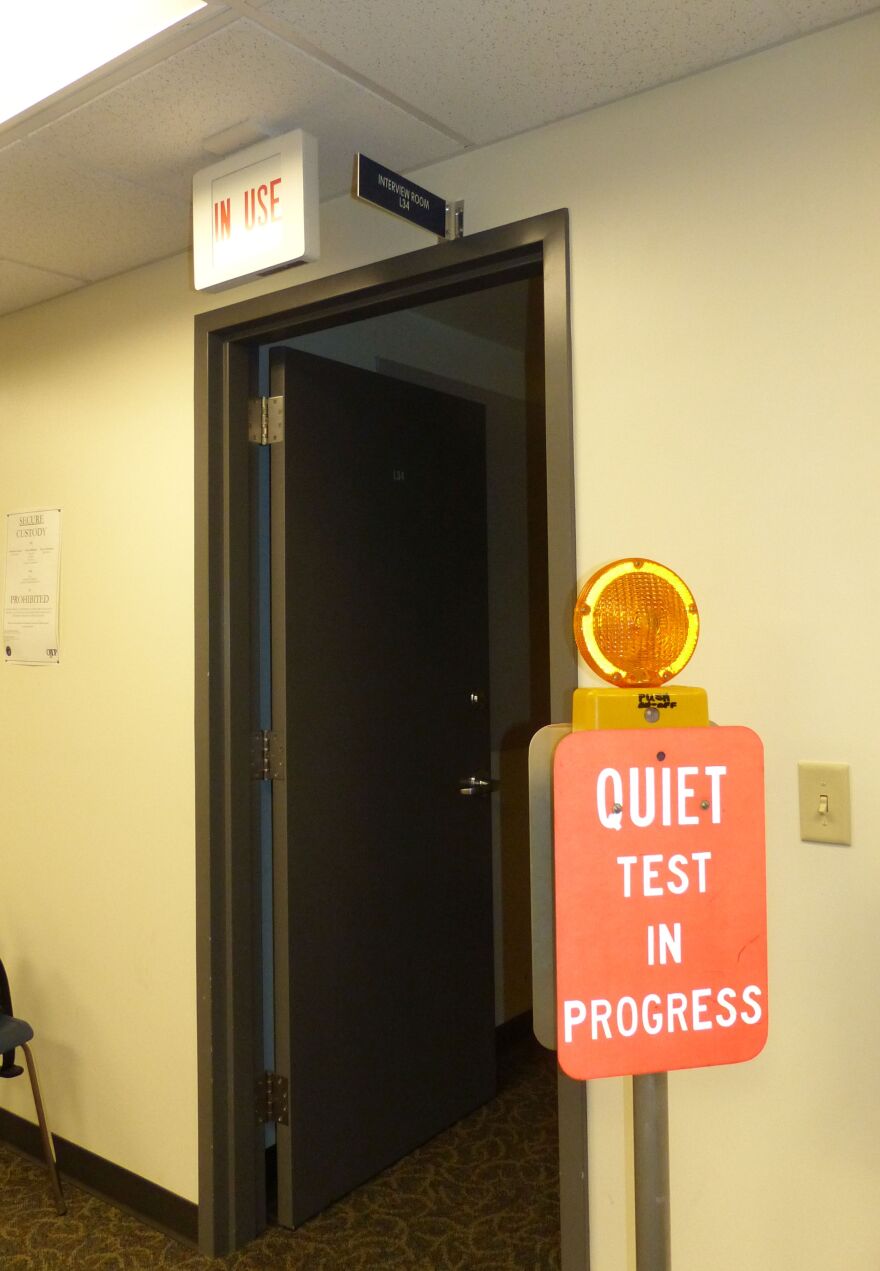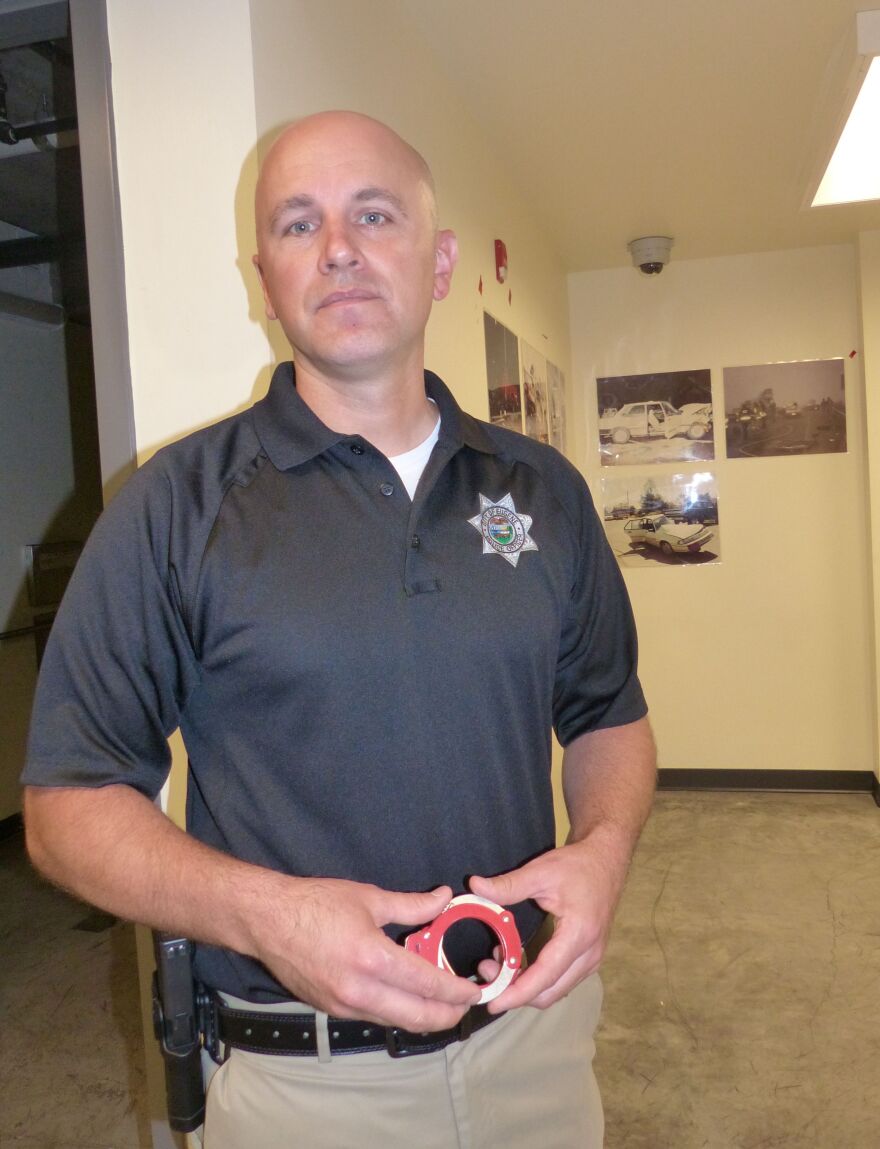A person caught drinking and driving can face jail time and the loss of license. But what about cannabis? Since Oregon legalized recreational pot in 2015, police have had to figure out how to determine impairment by the drug. In Eugene, it comes down to a cop’s trained perception.
DUII is driving under the influence of intoxicants. In Oregon, that could be alcohol, controlled substances, inhalants or marijuana. Motorist’s caught with a 0.08% blood alcohol level or above can be immediately charged with DUII. Breathilizer testing for alcohol is valid in court.
All patrol officers are trained to conduct *alcohol related DUI investigations. If alcohol is ruled out—but patrol still suspects impairment —they’ll call in an officer like Travis Cooper. He’s one of 7 Drug Recognition Experts with the Eugene Police Department.
“If the custody consents to it I conduct a drug influence evaluation,” Cooper says. “That’s a 12 step process. I take their pulse, blood pressure, measure their pupil size in 3 different lighting conditions.”
And then there are tests.
“One that seems particularly helpful with marijuana investigations is one called the modified Romberg balance test,” says Cooper. “That’s a mental time estimation test.
Because, Cooper says, it’s tough for people who are super stoned to keep an accurate perception of time.
“We have people stand feet together, arms down at their sides,” Cooper explains. “Basically we’re going to have them close their eyes and estimate the passage of 30 seconds. So they’re not counting out loud or bobbing head or moving their lips. This is one where people under the influence of cannabis tend to struggle. It’s not uncommon to get to what they think is 30 and it’s actually been 54 seconds.”
Cooper says this time estimation test can relate to driving skills.

“If you look at a yellow light and you need to estimate your speed relative to how far away that light is and do you have enough time to make it through or do you need to stop.”
Another test used to rule out cannabis is a “lack of convergence” test.
“Which is an eye test to see if people can cross their eyes,” Cooper says.
It seems when people are high, they typically can’t cross their eyes. Who knew?
After conducting a drug influence evaluation, Cooper decides whether or not he thinks the person is impaired by marijuana, some other drug or a medical condition.
If you’re thinking this sounds like a pretty subjective process-- Cooper emphasizes that the Drug Recognition Expert (DRE) program is accepted by the courts.
“Case law in Oregon has already established that the DRE program is admissible,” Cooper says. “We don’t need to hash through whether it’s valid every single time we go to trial.”
Nationwide, only 1% of police officers go through the two weeks of classroom time and weeklong testing to certify as a DRE. Officer Cooper trained in downtown Portland and observed the behavior of people under a variety of intoxicants.

“The way it works instructors they go out under the Burnside Bridge and other places that are frequented by people that are struggling with addiction,” says Cooper. “And they offer them a sandwich, some cigarettes and they come back and do a drug influence evaluation. Some come back night after night too.”
Last year, Cooper was called in for 36 drug influence evaluations. He says Lane County had the highest number of DRE requests in the state.
“All of us, all officers and drug recognition experts, would love to have a machine like the breathalyzer machine that we have for alcohol, because that’s a scientifically validated, reliable tool that we can use to objectively show that this person’s impaired,” Cooper says. “The science just is not there right now with cannabis.”
Even though pot is legal in Oregon, Cooper says nothing has changed when it comes to DUI.

Have to be illegal: “Alcohol is impairing substance. You can be impaired by lawfully owned prescription medications. So the way Oregon’s DUI laws are written, it doesn’t required that a substance is illegal.”
Law enforcement urges cannabis consumers to allow a couple hours before getting behind the wheel. Even longer for edibles. If you don’t pay attention to your impairment level while driving, (sound of police saying “pull over”) it’s very possible Officer Cooper will.









